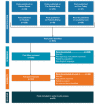The Patient Experience of Acute Lymphoblastic Leukemia and Its Treatment: Social Media Review
- PMID: 37126376
- PMCID: PMC10186186
- DOI: 10.2196/39852
The Patient Experience of Acute Lymphoblastic Leukemia and Its Treatment: Social Media Review
Erratum in
-
Correction: The Patient Experience of Acute Lymphoblastic Leukemia and Its Treatment: Social Media Review.JMIR Cancer. 2023 Dec 20;9:e54665. doi: 10.2196/54665. JMIR Cancer. 2023. PMID: 38118141 Free PMC article.
Abstract
Background: Adult patients with acute lymphoblastic leukemia (ALL) report substantial disease- and treatment-related impacts on their health-related quality of life (HRQOL). Patient-reported information (PRI) shared on social media may provide a distinct opportunity to understand the patient experience outside of formal research contexts and help inform the development of novel therapies.
Objective: This qualitative social media review aimed to assess PRI shared on social media websites to gain a better understanding of the symptom, HRQOL, and treatment impacts on individuals with ALL.
Methods: We identified English-language posts on 3 patient advocacy websites (Patient Power, The Patient Story, and Leukaemia Care) and YouTube that included PRI about experiences with ALL or ALL treatments shared by adults (aged ≥18 years) with a self-reported ALL diagnosis. Patients' demographic and disease characteristics were extracted from posts (where available), and the posts were analyzed thematically. A network analysis was conducted to delineate possible associations among ALL symptoms, HRQOL impacts, and treatment-related symptoms and impacts.
Results: Of the 935 social media posts identified, 63 (7%) met the review criteria, including 40 (63%) videos, 5 (8%) comments posted in response to videos, and 18 (29%) blog posts. The 63 posts were contributed by 41 patients comprised of 21 (51%) males, 18 females (44%), and 2 (5%) whose gender was not reported. Among the patients, 13 (32%) contributed >1 source of data. Fatigue (n=20, 49%), shortness of breath (n=13, 32%), and bruising (n=12, 29%) were the symptoms prior to treatment most frequently discussed by patients. Patients also reported impacts on personal relationships (n=26, 63%), psychological and emotional well-being (n=25, 61%), and work (n=16, 39%). Although inpatient treatment reportedly restricted patients' independence and social functioning, it also provided a few patients with a sense of safety. Patients frequently relied on their doctors to drive their treatment decisions but were also influenced by family members. The network analysis indicated that disease-related symptoms were primarily associated with patients' physical functioning, activities of daily living, and ability to work, while treatment-related symptoms were primarily associated with emotional well-being.
Conclusions: This social media review explored PRI through a thematic analysis of patient-contributed content on patient advocacy websites and YouTube to identify and contextualize emergent themes in patient experiences with ALL and its treatments. To our knowledge, this is the first study to leverage this novel tool to generate new insights into patients' experiences with ALL. Patients' social media posts suggest that inpatient care for ALL is associated with restricted independence and social functioning. However, inpatient care also provided a sense of safety for some patients. Studies such as this one that capture patients' experiences in their own words are valuable tools to further our knowledge of patient outcomes with ALL.
Keywords: acute lymphoblastic leukemia; adult; disease; emotional; functioning; health-related quality of life; independence; leukemia; lymphoblastic; qualitative research; social; social media; symptoms; therapy; treatment; well-being.
©Rebecca Crawford, Slaven Sikirica, Ross Morrison, Joseph C Cappelleri, Alexander Russell-Smith, Richa Shah, Helen Chadwick, Lynda Doward. Originally published in JMIR Cancer (https://cancer.jmir.org), 01.05.2023.
Conflict of interest statement
Conflicts of Interest: RC, RM, HC, and LD are employees of Research Triangle Institute (RTI) Health Solutions, and this study was performed under a research contract between RTI Health Solutions and Pfizer Inc. SS, JCC, ARS, and RS are employees of Pfizer Inc.
Figures



References
-
- Samra B, Jabbour E, Ravandi F, Kantarjian H, Short NJ. Evolving therapy of adult acute lymphoblastic leukemia: state-of-the-art treatment and future directions. J Hematol Oncol. 2020 Jun 05;13(1):70. doi: 10.1186/s13045-020-00905-2. https://jhoonline.biomedcentral.com/articles/10.1186/s13045-020-00905-2 10.1186/s13045-020-00905-2 - DOI - PMC - PubMed
-
- Lepretre S, Touboul C, Flinois A, Kutikova L, Makhloufi K, Chauny J-V, Désaméricq G. Quality of life impairment in adult patients with acute lymphoblastic leukemia with minimal residual disease in France. Blood. 2019;134:5123. doi: 10.1182/blood-2019-122466. - DOI
LinkOut - more resources
Full Text Sources
Miscellaneous

